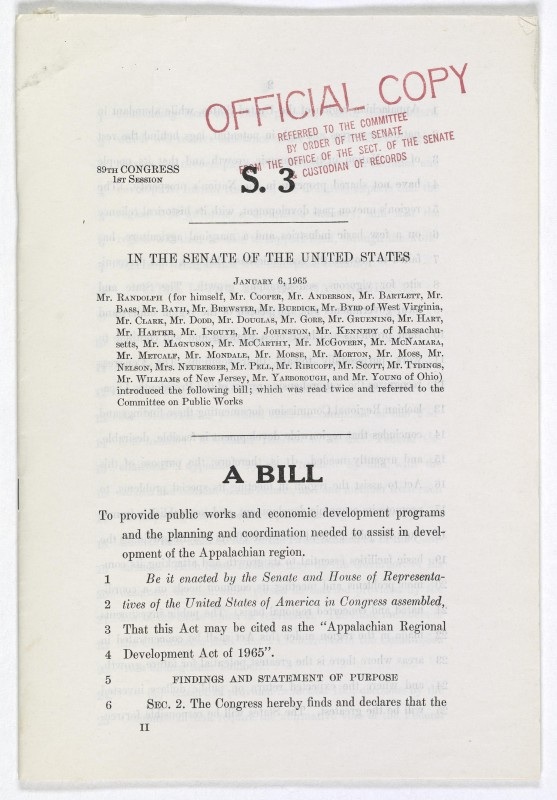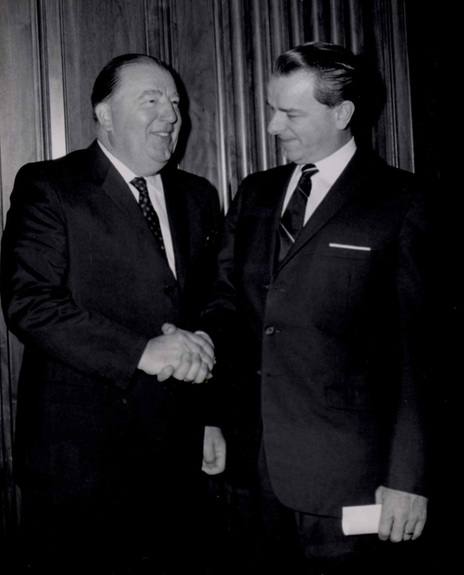The work of the ARC has included widespread infrastructure and employment improvements, the Appalachian Development Highway System being one of its core projects. As a member of the ARC, West Virginia receives funds which have supported the construction of the corridor highway system that links the state’s roads to the Interstate Highway System. Many of these projects are today attributed to the leadership of Senator Robert C. Byrd who served on the Senate Appropriations Committee and worked to appropriate the maximum funds available for ARC projects. However, the ARC has not operated for the past 50 years without opposition. As a continuing recipient of appropriated funds from Congress, the ARC is subject to reauthorization, a process which has not always been easy. From its passage in 1965 through the mid-1980s and until 2010, the successful reauthorization of the ARC was due in large part to the work of West Virginia Senators Jennings Randolph and Robert Byrd. The first major challenge the ARC’s continuation came just 4 years after its original passage. In 1969, Senator Jennings Randolph sponsored Senate Bill 1072 to increase annual funding levels and to continue the act through 1971 (the original funding levels were set to expire in 1969). On February 18, 1969, Senator Randolph delivered a speech in support of the extension, stating that “the Appalachian Regional Development Program has already proved to be a successful experiment.” The chief opposition to the funding of the ARC came through senators from other states where redevelopment authorities had been established in the model of the ARC and who were now fighting for funding for their own districts. Two years later in 1971, Senator Byrd introduced legislation to continue the ARC’s 100% funding level through 1975. This time, he faced opposition not from fellow senators but from President Richard Nixon who wanted to defund the ARC in favor of his revenue-sharing program to aid depressed rural areas. Though the ARC faced reduction in its budgets over these years, it continued to be funded through the efforts of Senators Byrd and Randolph. The 1980s were especially difficult the ARC. Senator Byrd’s role as Majority Leader of the U.S. Senate and his focus on national issues precluded his ability to continuously fight against the republican Reagan Administration for increased funding. By the end of the 1980s, owing to the Reagan Administration’s refusal to allow increases, ARC funding levels had decreased by over 65%. When Senator Byrd became Chairman of the Senate Appropriations Committee in 1989, he shifted his attention back to the ARC. On September 13, 1990, Senator Byrd testified before the Senate Committee on Environment and Public Works in support of continuing the ARC. Between 1989 and 1994, Senator Byrd successfully appropriated $896 million to the ARC’s Appalachian Highway System budget. In a 1994 letter, Fred VanKirk, Commissioner of West Virginia State Highways thanked Senator Byrd for his leadership in regaining federal support for the ARC. The ARC continues to receive appropriations for the funding of projects throughout the Appalachian Region, including the highway project. In West Virginia, over 400 miles of highways linking the Interstate Highway System across the state have been completed, including Corridors D, E, G, L, and Q. The sixth planned highway, Corridor H, is still under construction. Throughout the Appalachian Regional Development Area, 3,090 miles of highways have been constructed with funding through the ARC. Senator Byrd and Senator Randolph’s legacy of support for the ARC continues to enable the improvement of infrastructure in one of the nation’s most economically-depressed regions.
Comments are closed.
|
Welcome to the Byrd Center Blog! We share content here including research from our archival collections, articles from our director, and information on upcoming events.
Categories
All
Archives
July 2023
|
Our Mission: |
The Byrd Center advances representative democracy by promoting a better understanding of the United States Congress and the Constitution through programs and research that engage citizens.
|
Copyright © Robert C. Byrd Center for Congressional History and Education
|




 RSS Feed
RSS Feed
